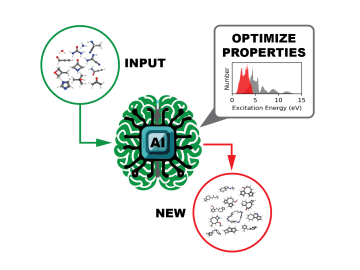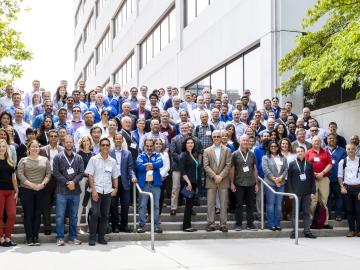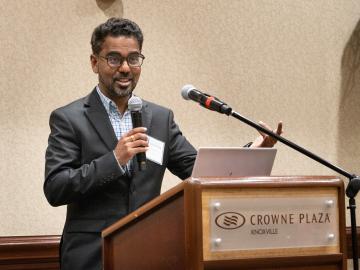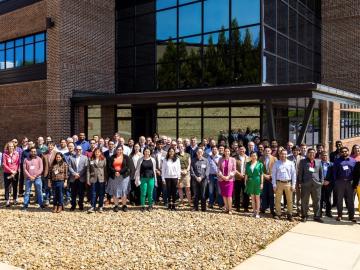Filter News
Area of Research
- (-) Supercomputing (37)
- Advanced Manufacturing (1)
- Biology and Environment (9)
- Computational Biology (1)
- Computational Engineering (1)
- Computer Science (6)
- Electricity and Smart Grid (1)
- Energy Science (8)
- Functional Materials for Energy (1)
- Fusion and Fission (1)
- Materials (9)
- National Security (12)
- Neutron Science (6)
News Topics
- (-) Artificial Intelligence (37)
- 3-D Printing/Advanced Manufacturing (5)
- Advanced Reactors (1)
- Big Data (22)
- Bioenergy (9)
- Biology (11)
- Biomedical (17)
- Biotechnology (2)
- Buildings (4)
- Chemical Sciences (5)
- Computer Science (96)
- Coronavirus (14)
- Critical Materials (3)
- Cybersecurity (8)
- Energy Storage (8)
- Environment (22)
- Exascale Computing (26)
- Frontier (32)
- Fusion (1)
- Grid (5)
- High-Performance Computing (43)
- Isotopes (2)
- Machine Learning (15)
- Materials (15)
- Materials Science (16)
- Mathematics (2)
- Microscopy (7)
- Molten Salt (1)
- Nanotechnology (11)
- National Security (8)
- Neutron Science (13)
- Nuclear Energy (4)
- Partnerships (1)
- Physics (8)
- Polymers (2)
- Quantum Computing (20)
- Quantum Science (24)
- Security (6)
- Simulation (16)
- Software (1)
- Space Exploration (3)
- Summit (43)
- Transportation (6)
Media Contacts

ORNL has been recognized in the 21st edition of the HPCwire Readers’ and Editors’ Choice Awards, presented at the 2024 International Conference for High Performance Computing, Networking, Storage and Analysis in Atlanta, Georgia.

A team of computational scientists at ORNL has generated and released datasets of unprecedented scale that provide the ultraviolet visible spectral properties of over 10 million organic molecules.

Research performed by a team, including scientists from ORNL and Argonne National Laboratory, has resulted in a Best Paper Award at the 19th IEEE International Conference on eScience.

ORNL has joined a global consortium of scientists from federal laboratories, research institutes, academia and industry to address the challenges of building large-scale artificial intelligence systems and advancing trustworthy and reliable AI for

The world’s first exascale supercomputer will help scientists peer into the future of global climate change and open a window into weather patterns that could affect the world a generation from now.

Scientists at ORNL used their expertise in quantum biology, artificial intelligence and bioengineering to improve how CRISPR Cas9 genome editing tools work on organisms like microbes that can be modified to produce renewable fuels and chemicals.

The Department of Energy’s Oak Ridge National Laboratory announced the establishment of the Center for AI Security Research, or CAISER, to address threats already present as governments and industries around the world adopt artificial intelligence and take advantage of the benefits it promises in data processing, operational efficiencies and decision-making.

ORNL hosted its annual Smoky Mountains Computational Sciences and Engineering Conference in person for the first time since the COVID-19 pandemic.

The Department of Energy’s Oak Ridge National Laboratory hosted its Smoky Mountains Computational Science and Engineering Conference for the first time in person since the COVID pandemic broke in 2020. The conference, which celebrated its 20th consecutive year, took place at the Crowne Plaza Hotel in downtown Knoxville, Tenn., in late August.

ORNL hosted its fourth Artificial Intelligence for Robust Engineering and Science, or AIRES, workshop from April 18-20. Over 100 attendees from government, academia and industry convened to identify research challenges and investment areas, carving the future of the discipline.


